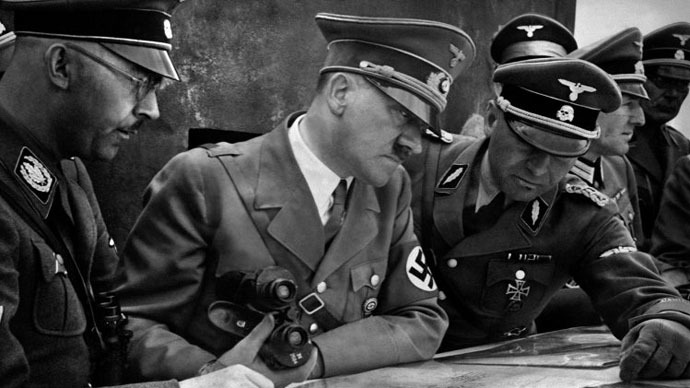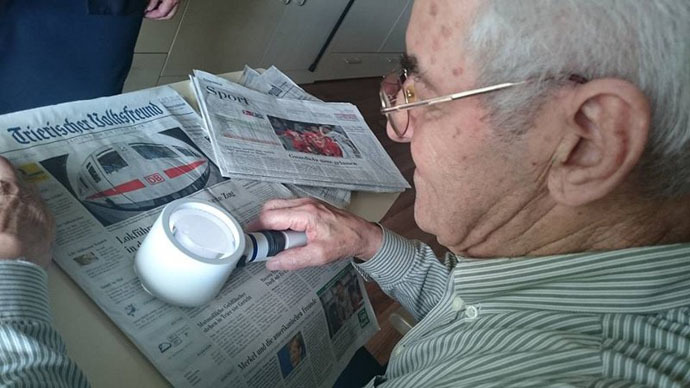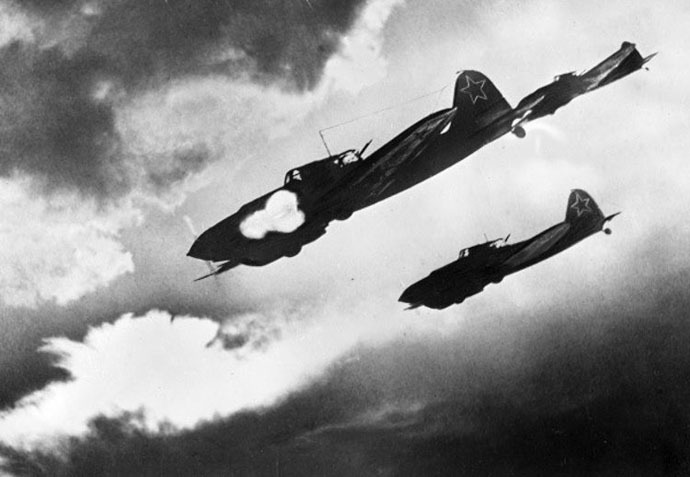A tale of war: The meaning of peace

This weekend all of Russia pays tribute to not just Soviet soldiers and citizens who sacrificed in the Great Patriotic War, but to the sacrifice of all humanity.
As we bear witness once again to age-old misunderstandings, and to shadows cast over peaceful nations, our most profound lessons come from those who witnessed the utter horror that was World War Two. I know my interview with a German soldier, who lived to see today, will offer a sliver of insight into why we must stay the current path of world détente.
The following is a remedial primer on the strength that comes from knowing total war, and a clear view of true history through the still gleaming eye of a soldier, an enemy, and a normal, decent human being. It is the irrefutable truth of bitter war; it is the conflict itself that is the enemy. Every hero of this epic story refutes the ideology of Adolf Hitler.
Barbarossa & barbaric overtures
On June 22, 1941, Hitler’s Axis legions invaded without warning the frontiers of the Soviet Union. Having already obliterated its opposition in Western Europe, Nazi Germany and its allies opened up the so-called Eastern Front of the European theater of World War II. This region of conflict would very soon become the pivotal battleground in humanity’s most devastating war. On that summer day, four million Axis soldiers attacked across a front 2,900 km (1,800 miles) long. Over the next three and half years, tens of millions would perish across this landscape. Before victory could be achieved, the most grievous wound in all human history would be carved into the Eurasian geography, and into the heart of every Russian.
Operation Barbarossa was the rising of the fascist tide, an ideological conquest aimed at subjugating hundreds of millions to a master race outlined in Mein Kampf (My Struggle). The Lebensraum ('living space') this Arian nation would require laid primarily in the vast interior of Russia. Furthermore, the slave labor needed to serve a 1000 year Reich were residents from the steppes to Siberia and beyond. The utter darkness of the Nazi plan is cemented in the words of Hitler’s notorious SS Reichsführer Heinrich Himmler. Of the lands in the east, Himmler foretold in his personal diary: “I work for my ideal of German womanhood with whom, someday; I will live my life in the east and fight my battles as a German far from beautiful Germany.”

Decency thrust into the crucible
So the stage was set, over 70 years ago, for what takes place on Red Square and elsewhere this week. Back then, the entire world’s tangible human resource was bent on mutual annihilation, which almost succeeded. Many will recount the battles, the heroes, and the sheer drama of this legendary calamity today, but I want you to see the Great Patriotic War from a normal perspective, one which anyone can identify with. The story of Herbert Ludwig, a retired electrician from the small village here in Rhineland-Palatinate near Trier, Germany, it’s what I’d called validating normalcy on World War II. This elderly gentleman, who now lives at Altenheim St. Josef Schweich, speaks volumes about the utter cataclysm and coincidence that is world war. I visited Herr Ludwig, and some other veterans who wished not to be named, to hear their views on the war.
Born December 25th, 1925, Herbert Ludwig was called to serve in the summer of 1943. The son of a World War I artillery officer, Herbert’s service began in Wiesbaden, helping to construct Luftwaffe airfield emplacements. This was, I found, a typical initiation for recruits for Germany’s armed forces, during this part of the war.
Like others in his group, Herbert spent some weeks being indoctrinated, before being sent to progressively more critical duties abroad. What impressed me most about Herbert during our interview was his crystal clarity in recollecting, as well as his apparent kindness. The former artillery Obergefreiter (Lance Corporal), unraveled for me not just the nature of Hitler’s armed forces in 1943 with regard to the Allied forces, but also a bit of how our (the West’s) perception of Nazi Germany at the turning point is so typically wrong. In our two hour talk the 90-year-old veteran laid out step-by-step, how the average German went to war. A single front war in Europe looked like a looming victory from deep inside Nazi Germany. Herbert’s timeline of duty stations, training adventures, triumphs and catastrophes, his tale of fascinating happenstances, it should be the subject of this story. His wonderful recollections, the man’s genuine honesty and humility though, it gives way to the larger epoch. Herbert serves as before, as a meaningful cast member, albeit one of impeccable clarity.
For me, the writer, how should I encapsulate a vivid life, the shimmering vision of what most all these veterans today represent? I only wish we all had the time to relive with “Herr” Ludwig and you the reader, what heavy artillery training in Metz was like in a France fully succumbed to Hitler’s armies. If I could relay the look in the former soldier’s eye at his story of happenstance at a town called Bitche, which is now in France. It was there in Herbert’s recollections, that I first heard him tell of the Russian Front. And with some trepidation, I might add. Bitche was where all the troops from Herbert’s region were staged to be shipped to Russia to fight. I asked Herbert if being sent to the Russian Front was perceived as a “death sentence” at that stage. My perception being that of Western movie clichés, I was surprised mightily by his answer: “It was the cold, the crippling cold we were afraid of. Bitche was the place they issued us winter uniforms and equipment.”
Ordinary rumors of victory & defeat
There it was, 1943 and World War II in a tidy bundle. While I am sure you’d love to hear how relieved Private Ludwig was his artillery training officer from Metz snagged him from the jaws of death coincidentally, another point is more important to understand. You see, for those inside Germany, the defeat at Stalingrad in the winter had not sunk in yet, and the decisive tank battle at Kursk had yet to be fought. Like so many who have fought in great and small wars, Herbert Ludwig was sent hither and to at the whim of fate. In our interview several poignant moments stood out. The first of these came when the still young German spoke of his father. Family you see plays a central role among comrades in arms, Allies or Axis. Of his Dad’s wartime service, and their visitations during WW II, the younger Ludwig remembers his father’s visiting him on several occasions. On one of these, the elder man begged Herbert’s commanding officer, a young captain, to take the experienced artilleryman, rather than his inexperienced son to war.
“Father asked my Captain if the Wehrmacht could not use an experienced gunner, rather than his 18-year-old son. He was over 50 then, so he was declined. I was happy he did not have to go.”
Talking with this soldier and another at the old folks’ home in Schweich, I got a sort of communal portrait of the typical German soldier from the war. To this day there is a familiar distinction, one I recollect from my own service in the US Navy. There’s the “common soldier”, and then there’s what you’d call the “career soldier” among stereotypes. The ordinary citizen soldier’s view, this is what tells us of the lessons of conflict. Now let Herr Ludwig and I tell you of D-Day, the impact the Soviets had on the war effort, and of hell raining from the skies over Normandy. For it is in this we can discern the meaning of the May 9th celebrations on Red Square.

The nitty-gritty of World War Two
By May of 1944 Herbert Ludwig had attained the rank of Corporal with his mobile artillery unit. With the inevitability of an Allied invasion of France now assured, his unit was transferred to first Saint-Nazaire, and later Cherbourg to the North. Remembering what I’d asked him about the Soviets and the pressures on the Axis caused, it was here during the Normandy Campaign the old soldier uncloaked the needy truth of the war in Europe the world needs today. The scattered forces arrayed to fend off a mighty invasion were slaughtered as much by Soviet warriors as by American, British or Canadian heroes.
Artillery spotter turned sentry, Corporal Herbert Ludwig awoke the day after the D-Day landings to a summoning by his unit’s commander: “Ludwig, come up here and see what is about to roll over us.” In the man’s room at the old folks’ home today, he stares off into the distance out his windows, past yesterday and onto this remembered scene. Watching him recall, it obvious I cannot image what his mind’s eye sees. “The men, machines, and airplanes stretched to the horizon,” he told me. “The soldiers in that artillery entrenchment,” he recalls, “were jovial, seemingly resigned to their fate. At least this is the sense I got from the old man’s recounting the events of those few days in June of 1944.” Truly, the armada leveled onto the Axis occupiers on the beaches there was astonishing as anything in that war. However formidable they were though, once again victory or defeat did hinge on far off deeds, and weights and measures.
At this juncture of our talk, I had the presence of mind to ask; “Did you men perceive of missing units and forces arrayed against the Soviets?” At this he replied; “No, at the time we never thought of such things, we simply followed orders.” Next Ludwig recalled the night of June 7; the ever bitter reality that struck previously untested men:
“I was on sentry duty when I saw my first comrade fall. The planes came, and came, strafing and bombing all night long. We were machine gunned relentlessly from above, and many did not survive. Where was the Luftwaffe? Somehow we knew our pilots would come, but they never did.”
I asked Ludwig again about the impact of a two front war. “It’s clear to me now, if not for the Allied air forces we’d have held out against any assault.” And there it was, plain as the light of day, the steely truth of this war spoken in utter honesty, and without the politics of the 21st century. Thousands of fighter planes and bombers, millions of slaughtered Nazi soldiers, tanks stretching to the horizon, all that killing power arrayed against the Normandy invaders? If not for the Soviets the beaches of Normandy would have turned permanently scarlet! That is, if the Allied commanders would have even considered carrying on an impossible war.

Final duty of patriots
As I try and draw closed this text window into that world back then, the monumental totality of World War II sinks further in. Sitting in his stark room staring out at his homeland on the mighty Mosel River, Herbert Ludwig is a man at peace. The hills around this tiny town in the vineyards are quiet now; only faint echoes of General Patton’s onslaught through here remain. A scarred cathedral spire, a group of lonely and forgotten tombstones in a city graveyard, the glassy eyed stare of a kindly but aged villager here or there, these are the last memorials to the greatest catastrophe to ever befall humanity. As I listen to Herbert’s story, a final irony stabs like a bayonet strike. I told you about Herr Ludwig’s father, how he’d offered himself up in place of his son from the beginning. It turns out Ludwig retreated from Normandy, later to be captured near Paris, the interred in an American POW camp in Munich. On arriving home when the war ended he was surprised to find his non-combatant father had been killed near their shattered village home. The “Americans” had machine-gunned him, Herbert recollected without any disdain whatsoever. How ironic, I thought. The lucky young man exempted from the Russian Front, he too fell victim to World War II’s all encompassing certainty, no one escaped that hellish moment of insanity here on Earth.
As we ponder the politics and business of today, and the obvious repetition of past impudence toward one another, there simply has to be a resolution to the totality of human conflicts, to national conflict. The May 9th parades in Red Square are so misunderstood in the West. Brisling war machines, cadres and regiments marching in perfect step, heads called to attention, air power flying overhead all seems to militaristic to Americans. Flags waving overhead, sabers and guns slung proudly can be construed as aggression, but this is wholly missing the point. All those red stars, flowing banners and gigantic missiles are meant to remind us only; Russia always will defend herself, and forgetting that is an ever more dreadful arrogance today. May 9th is a memorial to all those who, for a time forgot, and were reminded, how perfect the peace is.
May God bless all the valiant among us, the unheralded human patriots among us like retired electrician Herbert Ludwig, no matter their nationality. I leave you with a prayer of recognition, from a past time to the present.
Phil Butler for RT.
Phil Butler is journalist and editor, and a partner at the digital marketing firm, Pamil Visions PR. Phil contributes to the Huffington Post, The Epoch Times, Japan Today, and many others. He's also a policy and public relations analyst for Russia Today, as well as other international media. You can find Phil's blog at http://www.phillip-butler.com.
The statements, views and opinions expressed in this column are solely those of the author and do not necessarily represent those of RT.
The statements, views and opinions expressed in this column are solely those of the author and do not necessarily represent those of RT.












